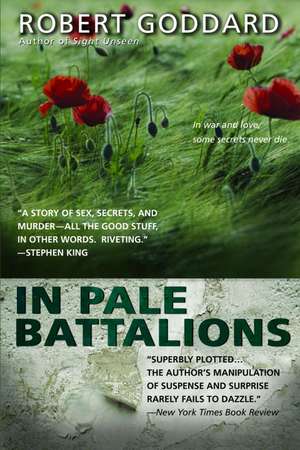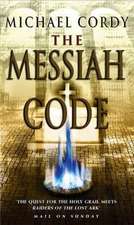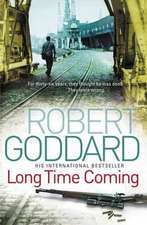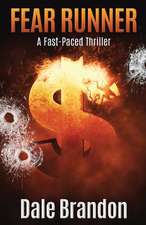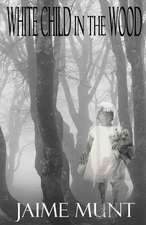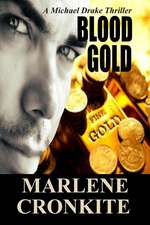In Pale Battalions
Autor Robert Goddarden Limba Engleză Paperback – 30 apr 2007
Their journey starts with an unscheduled stop at the imposing Thiepval Memorial to the dead of the Battle of the Somme near Amiens. Amongst those commemorated is Leonora's father. The date of his death is recorded and 30th April, 1916. But Leonora wasn't born until 14th March 1917.
Penelope at once supposes a simple wartime illegitimacy as the clue to her mother's unhappy childhood and the family's sundered connections with her aristocratic heritage, about which she has always known so little.
But nothing could have prepared her, or the reader, for the extraordinary story that is about to unfold.
From the Paperback edition.
| Toate formatele și edițiile | Preț | Express |
|---|---|---|
| Paperback (2) | 60.21 lei 24-30 zile | +36.14 lei 5-11 zile |
| Transworld Publishers Ltd – 29 sep 2010 | 60.21 lei 24-30 zile | +36.14 lei 5-11 zile |
| DELTA – 30 apr 2007 | 117.69 lei 3-5 săpt. |
Preț: 117.69 lei
Nou
Puncte Express: 177
Preț estimativ în valută:
22.52€ • 23.43$ • 18.59£
22.52€ • 23.43$ • 18.59£
Carte disponibilă
Livrare economică 24 martie-07 aprilie
Preluare comenzi: 021 569.72.76
Specificații
ISBN-13: 9780385339209
ISBN-10: 0385339208
Pagini: 368
Dimensiuni: 155 x 228 x 21 mm
Greutate: 0.36 kg
Editura: DELTA
ISBN-10: 0385339208
Pagini: 368
Dimensiuni: 155 x 228 x 21 mm
Greutate: 0.36 kg
Editura: DELTA
Notă biografică
Robert Goddard’s first novel Past Caring was an instant bestseller. Since then his books have captivated readers worldwide with their edge-of-the-seat pace and labyrinthine plots.
Extras
Chapter One
Childhood memories fit their own intricate pattern. They cannot be made to conform to the version of our past we try to impose upon them. Thus I could say that Lord and Lady Powerstock and the home they gave me at Meongate more than compensated for being an orphan, that a silver spoon easily took the place of my mother's smile. I could say it--but every recollection of my early years would deny it.
Meongate must once have been the crowded, bustling house of a cheerful family, as the Hallowses must once have been that family. Every favour of nature in its setting where the Hampshire downs met the pastures of the Meon valley, every effort of man in its spacious rooms and landscaped park, had been bestowed on the home of one small child.
Yet it was not enough. When I was growing up at Meongate in the early 1920s, most of its grandeur had long since departed. Many of the rooms were shut up and disused, much of the park turned over to farmland. And all the laughing, happy people I imagined filling its empty rooms and treading its neglected lawns had vanished into a past beyond my reach.
I grew up with the knowledge that my parents were both dead, my father killed on the Somme, my
mother carried off by pneumonia a few days after my birth. It was not kept from me. Indeed, I was constantly reminded of it, constantly confronted with the implication that I must in some way bear the blame for the shadow of grief, or of something worse, that hung over their memory. That shadow, cast by the unknown, lay at the heart of the cold, dark certainty that also grew within me: I was not wanted at Meongate, not welcomed there, not loved.
It might have been different had my grandfather not been the grave, withdrawn, perpetually melancholic man that he was. I, who never knew him when he was young, cannot imagine him as anything other than the wheelchair-bound occupant of his ground-floor rooms, deprived by his own morbidity, as much as by the lingering effects of a stroke, of all warmth and fondness. When Nanny Hiles took me, as she regularly did, to kiss him goodnight, all I wanted to do was escape from the cold, fleeting touch of his flesh. When, playing on the lawn, I would look up and see him watching me from his window, all I wanted to do was run away from the mournful, questing sadness in his eyes. Later, I came to sense that he was waiting, waiting for me to be old enough to understand him, waiting in the hope that he would live to see that day.
Lady Powerstock, twenty years his junior, was not my real grandmother. She was buried in the village churchyard, another ghost whom I did not know and who could do nothing to help me. I imagined her as everything her successor was not--kind, loving and generous--but it did me no good. Olivia, the woman I was required to address as Grandmama in her place, had once been beautiful and, at fifty, her looks were still with her, her figure still fine, her dress sense impeccable. That we were not related by blood explained, to my satisfaction, why she did not love me. What I could not explain was why she went so far as to hate me, but hate me she undoubtedly did. She did not trouble to disguise the fact. She let it hover, menacing and unspoken, at the edge of all our exchanges, let it grow as an awareness between us, a secret confirmation that she too was only waiting, waiting for death to remove her husband and with him any lingering restraint on her conduct towards me. There was an air of practised vice about her that was to draw men all her life, an air of voluptuous pleasure at her own depravity that made her hatred of me seem merely instinctive. Yet there was always more to it than that. She had drawn some venom from whatever part she had played in the past of that house and had reserved it for me.
My only friend in those days, my only guide through Meongate's hidden perils, was Fergus, the taciturn and undemonstrative major-domo, "shifty" as Olivia described him and certainly not as deferential as he should have been, but none the less my sole confidant. Sally, the sullen maid, and humourless Nanny Hiles both went in awe of Olivia, but Fergus treated her with an assurance, bordering on disrespect, that made him my immediate ally. A cautious, solitary, pessimistic man who had expected little from life and consequently been spared many disappointments, perhaps he took pity on a lonely child whose plight he understood better than she did herself. He would take me on covert expeditions through the grounds, or down to the wooded reach of the Meon where he fished of a quiet afternoon, or into Droxford in the trap, when he would buy me a twist of sherbet and leave me sitting on the wall outside Wilsmer's saddlery whilst he went in to haggle over a new bridle for the pony. For such brief moments as those, kicking my heels on Mr. Wilsmer's wall and eating my
sherbet in the sunshine, I was happy. But such moments did not last.
It was Fergus who first showed me my father's name, recorded with the other war dead of the village, on a plaque at the church. Their Name Liveth for Evermore, the inscription said, and his name--Captain the Honourable John Hallows--is all that did live for me. I would stare at it for what seemed like hours trying to conjure up the real living and breathing father that he had never been to me, seeing only those stiff, expressionless, uniformed figures preserved by photographs in back copies of the Illustrated London News, glimpsing no part of his true self beyond the neatly carved letters of his name.
As for my mother, of her there was no record at all, no grave, no memorial of any kind. Fergus, when I questioned him, prevaricated. My mother's grave, if she had one, was far away--and he did not know where. There were, I was to understand, limits to what even he could tell me. Whether he suggested it or not I cannot remember, but, for some reason, I decided to ask Olivia. I cannot recall how old I was when it happened, but I had followed her into the library, where she often went to look at a painting that hung there.
"Where is my mother's grave?" I said bluntly, partly intending the question to be a challenge. All hatred is, in time, reciprocated and I had come to hate Olivia as much as she hated me; I did not then appreciate how dangerous an enemy she could be.
She did not answer in words. She turned aside from that great, high, dark painting and hit me so hard across the face that I nearly fell over. I stood there, clutching the reddening bruise, too shocked by the pain of it to cry, and she stooped over me, her eyes blazing. "If you ever ask that question again," she said, "if you ever mention your mother again, I'll make you suffer."
The mystery of my mother thenceforth became the grand and secret obsession of my childhood. My father's death, after all, had a comforting simplicity about it. Every November there was an Armistice Parade in the village to commemorate the sacrifice of Captain the Honourable John Hallows and the many others like him. Though not permitted to join the Brownie troop that took part in the parade, I was allowed to go and watch and could imagine myself marching with all the little girls who, like me, had lost their father. But, at the end of the parade, they went home to their mothers; I could not even remember mine.
Sometimes, though, I thought I could remember her. It was impossible, of course, if what I had been told of her was true, but Olivia had succeeded in making me doubt everything I had not personally experienced, and there was one dim, early memory, seemingly at the very dawn of my recollection, to sustain what I so wanted to believe.
I was standing on the platform at Droxford railway station. It was a hot summer's day: I could feel the heat of the gravel seeping up through my shoes. A train was standing at the platform, great billows of smoke rising as the engine gathered steam. The man standing beside me, who had been holding my hand, stooped and lifted me up, cradling me in his arms to watch the train pull out. He was stout and white-haired. I remember the rumble of his voice and the brim of his straw hat touching my head as he raised his free hand to wave. And I was waving too, at a woman aboard the train who had wound down the window and was leaning out, waving also and smiling and crying as she did so. She was dressed in blue and held a white handkerchief in her right hand. And the train carried her away. And then I cried too and the stout old man hugged me, the brass buttons on his coat cold against my face.
I recounted the memory to Fergus one day, when we were returning from a mushrooming expedition. When I had finished, I asked him who he thought the old man was.
"Sounds like old Mr. Gladwin," he replied. "The first Lady Powerstock's father. He lived here . . . till she sent him away." By she Fergus always meant Olivia.
"Why did she do that?"
"She'd have had her reasons, I don't doubt."
"When did he go?"
"The summer of 1920, when you were three. Back to Yorkshire, so they say. A proper caution, was
Mr. Gladwin."
"Who was the pretty lady, Fergus?"
"That I don't know."
"Was she . . . my mother?"
He pulled up and looked down at me with a frown. "That she was not," he said with deliberate slowness. "Your mother passed away a few days after she had you. You know that. No amount of wanting is going to make you remember her."
"Then . . . who was the pretty lady?"
His frown became less kindly. "I told you: I don't know. That Mr. Gladwin, he was a close one. Now, look to that napkin or you'll pitch your breakfast into the lane--and mine with it."
If the pretty lady wasn't my mother, who was she? What was old Mr. Gladwin, my great-grandfather, to her? There were no answers within my reach, just the secret hope I went on harbouring that maybe my mother wasn't really dead at all, just . . . sent away, like old Mr. Gladwin.
I too was shortly to be sent away, to preparatory school in North Wales. It was the junior wing of Howell's, which some of the girls found austere and rigorous but where I felt at home from the very start. There were no shadows at school, no unspoken secrets from the past threatening to overtake me. It was the holidays I came to dread, the times when I knew I would have to return to Meongate to find Olivia waiting for me with her menacing smile, to find my grandfather even more frail and uncommunicative than when I'd left, to find Fergus a little less forthcoming each time with the priggish young lady he thought I was becoming.
Being sent away to boarding school at the age of eight meant I knew virtually nobody in Droxford--of my own age or any other. That, I suppose, is why I did not learn sooner about the murder at Meongate, why I was ignorant for so long of that fragment of our family's mystery.
I think it was the Cribbins boy who first told me. He used to help with the gardening during the summer holidays and was one of the few village children I had anything to do with. One warm, overcast afternoon, Cook gave me a glass of lemonade to take out to him in the orchard where he'd been put to cutting back brambles. We stood talking while he drank it. He asked me what the house was like inside.
"Haven't you ever been inside?" I retorted, a touch haughtily, for Howell's had trained me well.
"No fear," he said between gulps. "My dad's told me."
"Told you what?"
"'Bout the murder."
"What murder?"
"Don't you know, Miss? There were a murder done at Meongate, years ago. My dad told me."
"Oh that?" I replied. "Of course I know about that." It wouldn't have done to let him see that it had been kept from me.
The obvious person to ask for information was Fergus. I found him polishing the silver in the pantry.
"Murder, you say? Well, maybe there was and maybe there wasn't. What would Cribbins know?"
"Stop teasing, Fergus."
He laid down the knives he had been cleaning and stooped close to my ear. "I'm not teasing," he whispered. "She'd skin me alive if she heard me talking about it. It's a subject best left alone."
He knew better than to think I would leave it alone. The following afternoon, I tracked him down on the riverbank, at his favourite spot for fishing, where I could be certain we would not be overheard.
"Well? You can tell me here."
"Tell you what?"
"About the murder."
He grunted and flicked his line. "They're not biting today."
"Fergus!"
"I can see I'll get no peace till I tell you. It was during the war. One of his lordship's guests. Shot in his bedroom."
"Which bedroom?"
"Don't worry. It wasn't yours. It was one of those that are shut up."
"Who was he?"
"I told you: a guest. I forget his name."
"Who killed him?"
"They never found out."
"Gosh. You mean it's never been solved?"
"Not to this day."
"How exciting."
"I wouldn't call it exciting."
"You wouldn't call anything exciting."
He smiled. "Well, take heed of this: don't mention it to her. She'd not thank you for it."
"Was the murdered man a friend of hers, then?"
Fergus chuckled. "She doesn't have friends. You should know that. Now, clear off before you
frighten away all the fish in the river."
I taxed Fergus several more times on the subject but learned nothing. I dared not even ask anybody else. Cook and Sally had been handpicked, it seemed, for their avoidance of gossip. Perhaps, in Olivia's eyes, it compensated for their other deficiencies. They, I felt certain, would not help me. Besides, only to Fergus was I prepared to admit how little I truly knew of my family's history. Hints and snatches of hazy memory were all I had to go on.
I must have been a plague to Fergus with all my endless, unanswerable questions. Which room was the one where the murder was committed? Which room was my parents'? Why were there no pictures of them? Where was my mother buried? What did she look like? Why was Mr. Gladwin sent away? Who was the pretty lady? He would just tap his nose, say he couldn't remember or couldn't tell me, then distract me with one of his puzzles involving string and matchsticks.
Even the little he did give away would probably have ensured his dismissal had Olivia known of it. Returning from one of her trips to London, trips which grew ever more frequent as the years passed, she would first ignore me, then subject me to withering inquisitions. What had I been doing? Who had I been talking to? What books had I been reading? Occasionally, as I grew older, she would ask my opinion of a new dress she had bought, or of some sparkling addition to her jewellery. Sometimes, I would make the mistake of admiring the item.
Childhood memories fit their own intricate pattern. They cannot be made to conform to the version of our past we try to impose upon them. Thus I could say that Lord and Lady Powerstock and the home they gave me at Meongate more than compensated for being an orphan, that a silver spoon easily took the place of my mother's smile. I could say it--but every recollection of my early years would deny it.
Meongate must once have been the crowded, bustling house of a cheerful family, as the Hallowses must once have been that family. Every favour of nature in its setting where the Hampshire downs met the pastures of the Meon valley, every effort of man in its spacious rooms and landscaped park, had been bestowed on the home of one small child.
Yet it was not enough. When I was growing up at Meongate in the early 1920s, most of its grandeur had long since departed. Many of the rooms were shut up and disused, much of the park turned over to farmland. And all the laughing, happy people I imagined filling its empty rooms and treading its neglected lawns had vanished into a past beyond my reach.
I grew up with the knowledge that my parents were both dead, my father killed on the Somme, my
mother carried off by pneumonia a few days after my birth. It was not kept from me. Indeed, I was constantly reminded of it, constantly confronted with the implication that I must in some way bear the blame for the shadow of grief, or of something worse, that hung over their memory. That shadow, cast by the unknown, lay at the heart of the cold, dark certainty that also grew within me: I was not wanted at Meongate, not welcomed there, not loved.
It might have been different had my grandfather not been the grave, withdrawn, perpetually melancholic man that he was. I, who never knew him when he was young, cannot imagine him as anything other than the wheelchair-bound occupant of his ground-floor rooms, deprived by his own morbidity, as much as by the lingering effects of a stroke, of all warmth and fondness. When Nanny Hiles took me, as she regularly did, to kiss him goodnight, all I wanted to do was escape from the cold, fleeting touch of his flesh. When, playing on the lawn, I would look up and see him watching me from his window, all I wanted to do was run away from the mournful, questing sadness in his eyes. Later, I came to sense that he was waiting, waiting for me to be old enough to understand him, waiting in the hope that he would live to see that day.
Lady Powerstock, twenty years his junior, was not my real grandmother. She was buried in the village churchyard, another ghost whom I did not know and who could do nothing to help me. I imagined her as everything her successor was not--kind, loving and generous--but it did me no good. Olivia, the woman I was required to address as Grandmama in her place, had once been beautiful and, at fifty, her looks were still with her, her figure still fine, her dress sense impeccable. That we were not related by blood explained, to my satisfaction, why she did not love me. What I could not explain was why she went so far as to hate me, but hate me she undoubtedly did. She did not trouble to disguise the fact. She let it hover, menacing and unspoken, at the edge of all our exchanges, let it grow as an awareness between us, a secret confirmation that she too was only waiting, waiting for death to remove her husband and with him any lingering restraint on her conduct towards me. There was an air of practised vice about her that was to draw men all her life, an air of voluptuous pleasure at her own depravity that made her hatred of me seem merely instinctive. Yet there was always more to it than that. She had drawn some venom from whatever part she had played in the past of that house and had reserved it for me.
My only friend in those days, my only guide through Meongate's hidden perils, was Fergus, the taciturn and undemonstrative major-domo, "shifty" as Olivia described him and certainly not as deferential as he should have been, but none the less my sole confidant. Sally, the sullen maid, and humourless Nanny Hiles both went in awe of Olivia, but Fergus treated her with an assurance, bordering on disrespect, that made him my immediate ally. A cautious, solitary, pessimistic man who had expected little from life and consequently been spared many disappointments, perhaps he took pity on a lonely child whose plight he understood better than she did herself. He would take me on covert expeditions through the grounds, or down to the wooded reach of the Meon where he fished of a quiet afternoon, or into Droxford in the trap, when he would buy me a twist of sherbet and leave me sitting on the wall outside Wilsmer's saddlery whilst he went in to haggle over a new bridle for the pony. For such brief moments as those, kicking my heels on Mr. Wilsmer's wall and eating my
sherbet in the sunshine, I was happy. But such moments did not last.
It was Fergus who first showed me my father's name, recorded with the other war dead of the village, on a plaque at the church. Their Name Liveth for Evermore, the inscription said, and his name--Captain the Honourable John Hallows--is all that did live for me. I would stare at it for what seemed like hours trying to conjure up the real living and breathing father that he had never been to me, seeing only those stiff, expressionless, uniformed figures preserved by photographs in back copies of the Illustrated London News, glimpsing no part of his true self beyond the neatly carved letters of his name.
As for my mother, of her there was no record at all, no grave, no memorial of any kind. Fergus, when I questioned him, prevaricated. My mother's grave, if she had one, was far away--and he did not know where. There were, I was to understand, limits to what even he could tell me. Whether he suggested it or not I cannot remember, but, for some reason, I decided to ask Olivia. I cannot recall how old I was when it happened, but I had followed her into the library, where she often went to look at a painting that hung there.
"Where is my mother's grave?" I said bluntly, partly intending the question to be a challenge. All hatred is, in time, reciprocated and I had come to hate Olivia as much as she hated me; I did not then appreciate how dangerous an enemy she could be.
She did not answer in words. She turned aside from that great, high, dark painting and hit me so hard across the face that I nearly fell over. I stood there, clutching the reddening bruise, too shocked by the pain of it to cry, and she stooped over me, her eyes blazing. "If you ever ask that question again," she said, "if you ever mention your mother again, I'll make you suffer."
The mystery of my mother thenceforth became the grand and secret obsession of my childhood. My father's death, after all, had a comforting simplicity about it. Every November there was an Armistice Parade in the village to commemorate the sacrifice of Captain the Honourable John Hallows and the many others like him. Though not permitted to join the Brownie troop that took part in the parade, I was allowed to go and watch and could imagine myself marching with all the little girls who, like me, had lost their father. But, at the end of the parade, they went home to their mothers; I could not even remember mine.
Sometimes, though, I thought I could remember her. It was impossible, of course, if what I had been told of her was true, but Olivia had succeeded in making me doubt everything I had not personally experienced, and there was one dim, early memory, seemingly at the very dawn of my recollection, to sustain what I so wanted to believe.
I was standing on the platform at Droxford railway station. It was a hot summer's day: I could feel the heat of the gravel seeping up through my shoes. A train was standing at the platform, great billows of smoke rising as the engine gathered steam. The man standing beside me, who had been holding my hand, stooped and lifted me up, cradling me in his arms to watch the train pull out. He was stout and white-haired. I remember the rumble of his voice and the brim of his straw hat touching my head as he raised his free hand to wave. And I was waving too, at a woman aboard the train who had wound down the window and was leaning out, waving also and smiling and crying as she did so. She was dressed in blue and held a white handkerchief in her right hand. And the train carried her away. And then I cried too and the stout old man hugged me, the brass buttons on his coat cold against my face.
I recounted the memory to Fergus one day, when we were returning from a mushrooming expedition. When I had finished, I asked him who he thought the old man was.
"Sounds like old Mr. Gladwin," he replied. "The first Lady Powerstock's father. He lived here . . . till she sent him away." By she Fergus always meant Olivia.
"Why did she do that?"
"She'd have had her reasons, I don't doubt."
"When did he go?"
"The summer of 1920, when you were three. Back to Yorkshire, so they say. A proper caution, was
Mr. Gladwin."
"Who was the pretty lady, Fergus?"
"That I don't know."
"Was she . . . my mother?"
He pulled up and looked down at me with a frown. "That she was not," he said with deliberate slowness. "Your mother passed away a few days after she had you. You know that. No amount of wanting is going to make you remember her."
"Then . . . who was the pretty lady?"
His frown became less kindly. "I told you: I don't know. That Mr. Gladwin, he was a close one. Now, look to that napkin or you'll pitch your breakfast into the lane--and mine with it."
If the pretty lady wasn't my mother, who was she? What was old Mr. Gladwin, my great-grandfather, to her? There were no answers within my reach, just the secret hope I went on harbouring that maybe my mother wasn't really dead at all, just . . . sent away, like old Mr. Gladwin.
I too was shortly to be sent away, to preparatory school in North Wales. It was the junior wing of Howell's, which some of the girls found austere and rigorous but where I felt at home from the very start. There were no shadows at school, no unspoken secrets from the past threatening to overtake me. It was the holidays I came to dread, the times when I knew I would have to return to Meongate to find Olivia waiting for me with her menacing smile, to find my grandfather even more frail and uncommunicative than when I'd left, to find Fergus a little less forthcoming each time with the priggish young lady he thought I was becoming.
Being sent away to boarding school at the age of eight meant I knew virtually nobody in Droxford--of my own age or any other. That, I suppose, is why I did not learn sooner about the murder at Meongate, why I was ignorant for so long of that fragment of our family's mystery.
I think it was the Cribbins boy who first told me. He used to help with the gardening during the summer holidays and was one of the few village children I had anything to do with. One warm, overcast afternoon, Cook gave me a glass of lemonade to take out to him in the orchard where he'd been put to cutting back brambles. We stood talking while he drank it. He asked me what the house was like inside.
"Haven't you ever been inside?" I retorted, a touch haughtily, for Howell's had trained me well.
"No fear," he said between gulps. "My dad's told me."
"Told you what?"
"'Bout the murder."
"What murder?"
"Don't you know, Miss? There were a murder done at Meongate, years ago. My dad told me."
"Oh that?" I replied. "Of course I know about that." It wouldn't have done to let him see that it had been kept from me.
The obvious person to ask for information was Fergus. I found him polishing the silver in the pantry.
"Murder, you say? Well, maybe there was and maybe there wasn't. What would Cribbins know?"
"Stop teasing, Fergus."
He laid down the knives he had been cleaning and stooped close to my ear. "I'm not teasing," he whispered. "She'd skin me alive if she heard me talking about it. It's a subject best left alone."
He knew better than to think I would leave it alone. The following afternoon, I tracked him down on the riverbank, at his favourite spot for fishing, where I could be certain we would not be overheard.
"Well? You can tell me here."
"Tell you what?"
"About the murder."
He grunted and flicked his line. "They're not biting today."
"Fergus!"
"I can see I'll get no peace till I tell you. It was during the war. One of his lordship's guests. Shot in his bedroom."
"Which bedroom?"
"Don't worry. It wasn't yours. It was one of those that are shut up."
"Who was he?"
"I told you: a guest. I forget his name."
"Who killed him?"
"They never found out."
"Gosh. You mean it's never been solved?"
"Not to this day."
"How exciting."
"I wouldn't call it exciting."
"You wouldn't call anything exciting."
He smiled. "Well, take heed of this: don't mention it to her. She'd not thank you for it."
"Was the murdered man a friend of hers, then?"
Fergus chuckled. "She doesn't have friends. You should know that. Now, clear off before you
frighten away all the fish in the river."
I taxed Fergus several more times on the subject but learned nothing. I dared not even ask anybody else. Cook and Sally had been handpicked, it seemed, for their avoidance of gossip. Perhaps, in Olivia's eyes, it compensated for their other deficiencies. They, I felt certain, would not help me. Besides, only to Fergus was I prepared to admit how little I truly knew of my family's history. Hints and snatches of hazy memory were all I had to go on.
I must have been a plague to Fergus with all my endless, unanswerable questions. Which room was the one where the murder was committed? Which room was my parents'? Why were there no pictures of them? Where was my mother buried? What did she look like? Why was Mr. Gladwin sent away? Who was the pretty lady? He would just tap his nose, say he couldn't remember or couldn't tell me, then distract me with one of his puzzles involving string and matchsticks.
Even the little he did give away would probably have ensured his dismissal had Olivia known of it. Returning from one of her trips to London, trips which grew ever more frequent as the years passed, she would first ignore me, then subject me to withering inquisitions. What had I been doing? Who had I been talking to? What books had I been reading? Occasionally, as I grew older, she would ask my opinion of a new dress she had bought, or of some sparkling addition to her jewellery. Sometimes, I would make the mistake of admiring the item.
Recenzii
"One of my favourite books of the year...I recomment it to all ages and both sexes"—Sarah Broadhurst, Today
"A superbly plotted romantic thriller"—New York Times
"A novel of numerous twists and turns and surprises"—Sunday Telegraph
From the Paperback edition.
"A superbly plotted romantic thriller"—New York Times
"A novel of numerous twists and turns and surprises"—Sunday Telegraph
From the Paperback edition.
Descriere
After her husband's sudden death, Leonora Galloway sets off for Paris with her daughter Penelope. At last the time has come when secrets can be shared and explanations begin. But nothing could have prepared her, or the reader, for the extraordinary story that is about to unfold.
